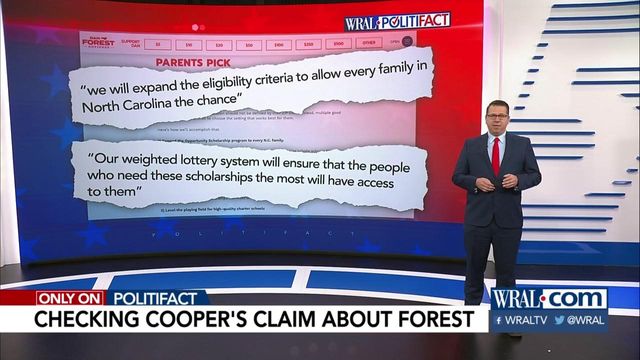Fact check: Cooper says Forest would allow 'rich' to use state aid for private schools
In a gubernatorial debate, Gov. Roy Cooper said Republican Lt. Gov. Dan Forest would allow "rich" families to use public tax dollars on a private school education. PolitiFact finds there's some truth to his claim, but it also lacks context.
Posted — UpdatedNorth Carolina Gov. Roy Cooper has cast his opponent as a threat to public schools.
And in last week’s gubernatorial debate, Cooper said Republican Lt. Gov. Dan Forest would allow “rich” families to use public tax dollars on a private school education.
“What Dan Forest really wants to do with our schools is starve them for funding, then use those tax dollars to help rich people send their kids to private school using vouchers,” Cooper said.
Cooper made a similar claim during a September online forum about education issues.
Cooper said Forest “has one goal for our public schools: Starve them for funding, then use those tax dollars to help rich people send their kids to private schools using vouchers. That’s right. Not only does he support vouchers, but he also wants to take the income limits off.”
Is it true that Forest wants to use tax dollars to help “rich people” send their kids to private school?
When reached by PolitiFact, Forest didn’t reject that idea.
A controversial program
Cooper is talking about Forest’s plan to modify Opportunity Scholarships, which are part of a state government program that offers financial aid to families who want their child to enroll in a participating nonpublic school.
The program has been controversial since its inception in 2013, with opponents saying it takes public dollars and spends them on private schools that may use religious-based curricula. In 2015, the North Carolina Supreme Court supported the program’s constitutionality in a 4-3 decision.
Since then, lawmakers have increased the program’s funding while Cooper has proposed phasing out the program.
As of now, the grants can be as high as $4,200 per year and they’re only available to low-income families. To receive the full amount under the current plan, a household of four must earn less than $48,470 annually to qualify.
We asked the Cooper campaign what he meant when he said Forest would open the program to “rich” families. Cooper campaign spokeswoman Liz Doherty said Cooper was referring to Forest’s support for eligibility expansion.
Forest’s position
He has released videos praising the program, pointing to the positive aspects of an evaluation conducted by N.C. State University that said it found test score increases among voucher recipients were “positive, large, and statistically significant.”
To ensure that poor people get grants before rich people, Forest says he would institute a “weighted lottery system.”
We asked the Forest campaign for more details on how Forest’s lottery system would work. We also asked why Forest believes the scholarships should be available to high-income families.
Spokesman Andrew Dunn said the campaign would not be responding.
Our ruling
Cooper said Forest wants to use tax dollars “to help rich people send their kids to private school using vouchers.”
Cooper was referring to the fact that Forest has said he wants to make North Carolina’s Opportunity Scholarship program available to “every family in North Carolina.”
That language suggests high-income families could access the funds. However, Forest says he’d implement a weighted lottery system to ensure low-income families have the best chance of accessing funds. It’s unclear how that system would work.
Cooper’s statement is partially accurate but leaves out important details, specifically Forest’s stated intent to give preference to poor families. We rate this claim Half True.
• Credits
Copyright 2024 by Capitol Broadcasting Company. All rights reserved. This material may not be published, broadcast, rewritten or redistributed.





